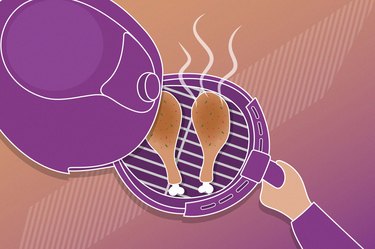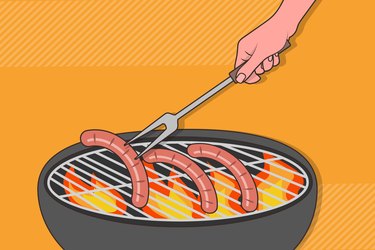
Air fryers are the cooking gadget of the moment — and unlike many other fads, this one's good news for your health.
Tossing your deep fryer in favor of an air fryer is a smart idea because deep frying is associated with several health risks. For example, a January 2021 meta-analysis in BMJ Heart found that eating fried food frequently is associated with heart disease and early death. And noshing on fried foods at least four times a week is associated with a higher risk of developing chronic disease, per an October 2015 review in Nutrients.
Video of the Day
Video of the Day
Ahead, dietitians explain how air fryers work, as well as the benefits — and risks — of air frying.
How Does the Air Fryer Fry Food?
Air fryers don't work the same way deep fryers do. Unlike deep fryers, air fryers cook food by circulating hot air around it, which is what lends the food a crispy and crunchy texture.
Deep frying, on the other hand, involves completely submerging food, which is usually breaded in hot oil.
As a result, the food absorbs the oil, and steam leaves the food when it's heated beyond its boiling point, according to Oklahoma State University. As the food loses moisture, a layer of crust forms on the outer surface — and that's how deep frying gives food an ultra-crispy layer.
Air Frying vs. Deep Frying
Commercial oils traditionally used in fast-food restaurants to deep fry tend to be partially hydrogenated, which creates artificial trans fats.
Trans fats naturally occur in some foods, but the Food and Drug Administration (FDA) deemed artificial trans fats in processed foods as no longer safe in 2015, so it banned including them in food as of 2020.
"As far as health risks, using an air fryer can help reduce the risk of heart disease because the food is not being deep-fried in oil. When oil is heated at high temperatures, it creates trans fats, which are not heart-healthy as it increases our LDL cholesterol," says Amber Trejo, RDN and founder of Naked Wellness.
Because most people at home use oils made from unsaturated fats, like olive, avocado and peanut oil, you don't have to worry about trans fats, Trejo says.
"Deep-fried foods, especially starchy fast foods, absorb a large amount of oil, which increases the risk of chronic illnesses. But air-fried foods may have minimal to no oils when cooked," says Razan Hallak, RD, a dietitian at The Ohio State University Wexner Medical Center.
"We don't have enough research on the risks of eating air-fried food daily," Hallak says. "But eating deep-fried food daily has many potential risks to our health due to the high amounts of oil they have. Replacing deep-fried fast food with air-fried options may be beneficial to our health."
Here are some other ways air frying can contribute to a more nutritious diet.
The Health Benefits of Air Frying
1. It May Help Reduce the Risk of Chemicals in Food
Air frying reduces the number of acrylamides formed in food during traditional frying. Acrylamides are chemicals that can form in some foods, like potatoes, when they are cooked under high temperatures, such as when you're crisping or browning, according to the National Cancer Institute (NCI).
Mice studies have found that acrylamide exposure in high doses increases the risk of certain cancers, but there aren't enough large human studies with consistent evidence that links the two.
"If you cook the food long enough for it to burn or char, that will increase acrylamide," Trejo says. "It would be ideal to not overcook your food in the air fryer to avoid charring."
Similarly, air frying can help reduce the number of heterocyclic amines (HCAs) and polycyclic aromatic hydrocarbons (PAHs) in foods because it doesn't char your food like grilling does, Trejo says.
Although research hasn't been able to definitively link HCA and PAH exposure from foods with cancer in humans, studies show that eating a lot of fried food is associated with an increased risk for colorectal, pancreatic and prostate cancers, per the NCI.
"The air fryer itself is not linked to HCAs or PAHs, which are chemicals that form when meat is cooked at high temperatures (creating charred food) or when fat is reused several times. Using the air fryer would actually help reduce the amount of these compounds made versus other cooking processes like an open-flame grill," Trejo says.
"The only time the air fryer would pose an increased risk of these compounds is if the temperature is too high resulting in burnt/charred food and oil being reused from not being cleaned right."
Indeed, reheating vegetable oils at high temperatures can generate PAHs, and taking in large amounts of cooking oils that have been heated multiple times is associated with lung, breast, colorectal and prostate cancers, per a September 2019 review in Critical Reviews in Food Science and Nutrition.
"Some chemicals could form when using the air fryer due to the prolonged cooking time it requires. But this is not much different from deep-frying food, which also allows for some chemicals to form due to the high temperature," Hallak says.
"Therefore, it could be more beneficial to focus more on the reduction of oil intake when using an air fryer until more research is available to understand the affect of air fryers on food chemical content compared to other cooking methods."
In other words: Use less oil with your air fryer.
2. It Can Aid in Weight Maintenance
If you're a big fan of fries, nuggets and chicken wings, the air fryer is a great way to cut down on added fat and calories.
"There are health risks involved in enjoying these foods daily when cooked in the traditional way (deep-fried) but using an air fryer can make it much better for weight maintenance and makes it healthier to eat multiple times during the week because the fat content is cut down a great deal," Trejo says.
That said, if you're using the air fryer to prepare packaged foods like French fries or chicken nuggets, these foods tend to be higher in sodium and have some saturated fat, so you should avoid eating them every day.
A good alternative would be to make your own fries with sweet potatoes and chicken nuggets using lean chicken breast, and air fry them at home.
"Potatoes are nutritious and can be made as French fries in the air fryer daily if you're making them yourself, and if you're paying attention to your calories, there's no reason to avoid homemade French fries in the air fryer," Trejo says.
3. It Can Help Preserve the Nutrients in Your Food
All forms of cooking can reduce the nutrient content in food to some degree.
But because air frying cooks food by circulating hot air around it instead of putting it in direct contact with heat, it can actually help preserve more nutrients than other cooking methods, Trejo says.
Air-Frying vs. Oven-Baking
Air frying and oven baking are both nutritious ways to prepare food. One isn't necessarily healthier than the other, but if you're looking to have food ready quickly, air fryers are smaller and can, therefore, cook food faster, Trejo says.
And because air fryers cook food by circulating hot air around it, they may also cook your meals more evenly.
Whether you choose to cook in an air fryer or in the oven, consider what you're preparing. How nutritious your meal will turn out depends on what ingredients you're incorporating.
"For example, are we adding breadcrumbs? If so, how much? Are we adding oils? If so, how much?" Trejo asks. You can easily make something a high-calorie item based on the ingredients you add.
So, How Bad Is It Really to Eat Air Fried Food Every Day?
There are many health perks to using an air fryer, but it can turn into an unhealthy tool if you're not cleaning it properly after each use, are using it to prepare packaged foods and are burning or charring your food in it.
For example, the air fryer can pose health risks for chemicals linked to cancer if you're cooking food under high temperatures for a longer period of time, which can make the food burnt or charred.
Many folks also don't clean their air fryers properly, and reusing old oil comes with some health risks.
How nutritious your meals are also depend on the type of foods you choose to prepare in the air fryer — i.e., don't use it to eat frozen French fries and chicken nuggets daily.
"The purpose of using an air fryer is to help cut down on fat used in the cooking process and offers a better alternative to deep frying. I would not go crazy about using fat while cooking in the air fryer — a quick spritz of oil spray is all you need," Trejo says.
At the end of the day, it comes down to what you're using the air fryer to cook, what other ingredients you're adding to it and how long you're cooking the food.
"One question to ask is how the use of an air fryer changes your diet. For example, if your current diet doesn't include any vegetables, and using the air fryer will help you add them to your meal, then this would be a great way to eat more nutrient-dense food," Hallak says.
"The benefits or risks of using the air fryer multiple times a day depends on what we are comparing it to. If your current diet is high [in] deep-fried food, then switching to an air fryer will be a good option to reduce [your] fat consumption. But if your current diet doesn't include many fried foods, then it might not be recommended to start using the air fryer multiple times a day."
- Critical Reviews in Food Science and Nutrition: "Impact of Consumption of Repeatedly Heated Cooking Oils on the Incidence of Various Cancers- A Critical Review"
- BMJ Heart: "Fried-Food Consumption and Risk of Cardiovascular Disease and All-Cause Mortality: A Meta-Analysis of Observational Studies"
- Nutrients: "Fried Food Consumption and Cardiovascular Health: A Review of Current Evidence"
- Oklahoma State University: "Industrial Deep Fat Frying"
- Food and Drug Administration: "Trans Fat"
- National Cancer Institute: "Acrylamide and Cancer Risk"
- National Cancer Institute: "Chemicals in Meat Cooked at High Temperatures and Cancer Risk"
- Mayo Clinic: "Trans Fat Is Double Trouble for Heart Health"



